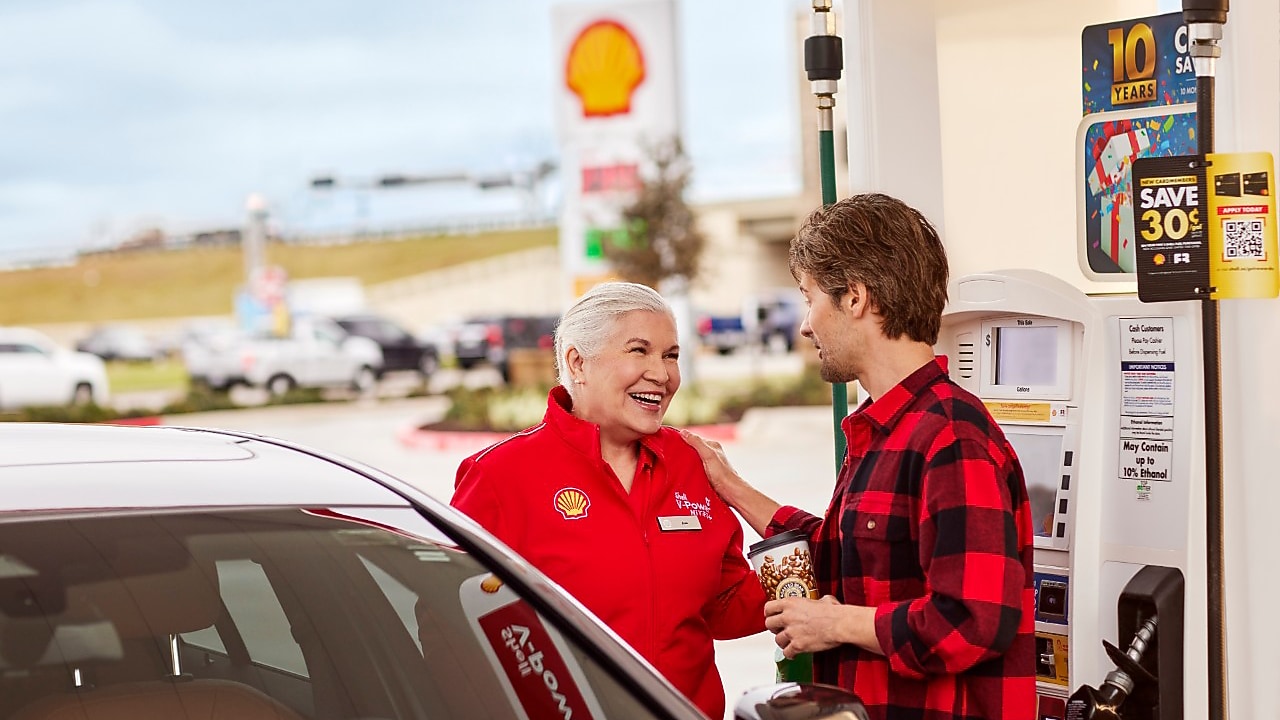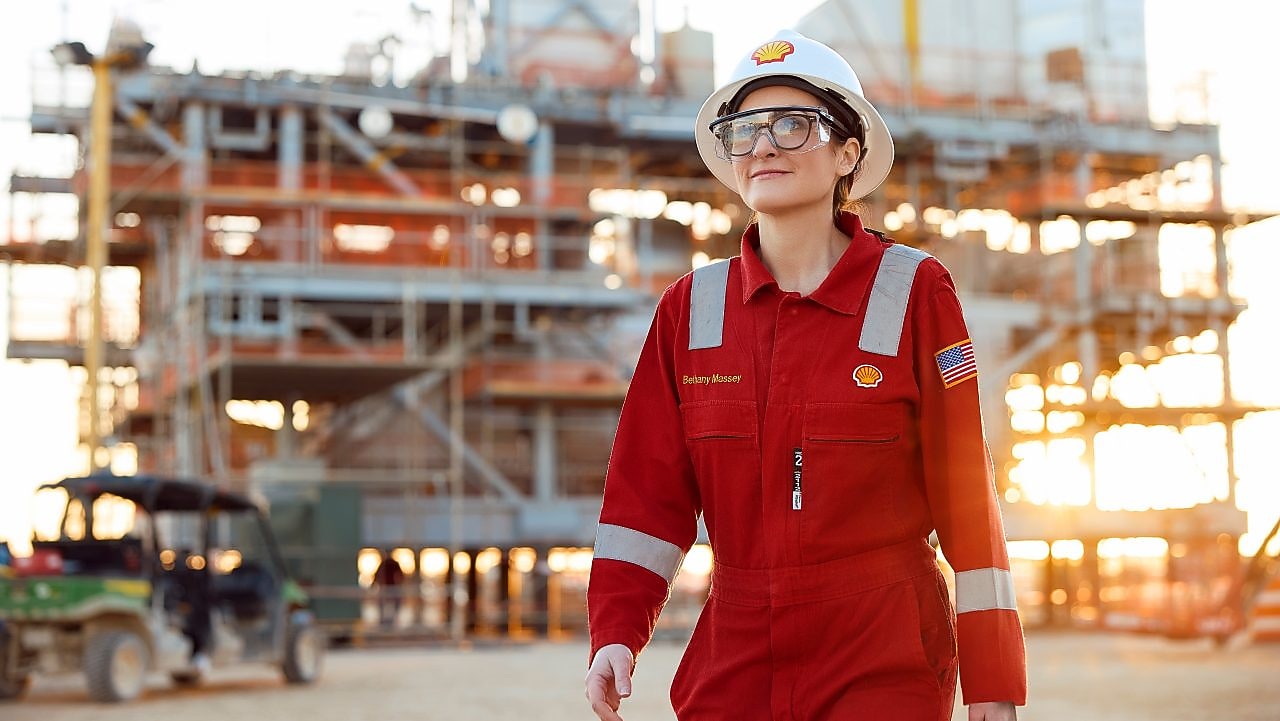
Progress at 35,000 feet
Airlines are using Sustainable Aviation Fuel (SAF) from Shell that can help reduce lifecycle carbon emissions by up to 80% when substituting for conventional jet fuel.* Together – progress is starting to take off.**
Read the transcript
Read the transcript
Title: SAF Explainer
Duration: 2:40 minutes
Description:
Learning about SAF, Sustainable Aviation Fuel from Delta Airlines Pilot, Shane Olstad, and farmer, Ben Penner.
SAF Explainer Transcript
[Background music plays]
An adaptation of the Sound of Shell plays, featuring fast-paced, ambient keys. Video footage
Drone shot showing Delta airplane parked on tarmac as the drone backs away from it. Switches to
footage showing the back of Captain Shane seated in the cockpit of the plane.
Captain Shane
I've been with Delta Air Lines for over 20 years. [Text displays]
Shane Olstad, Delta Air Lines Pilot
Video footage
Captain Shane is seated in an airport waiting area, facing the camera as he speaks to it. Name Strap appears lower left of the screen. Footage shows side on footage of Captain Shane in the cockpit as he speaks with the tower.
Captain Shane
Today Delta uses a small proportion of sustainable aviation fuel in our airplanes.
[Text displays]
Currently, SAF can be blended up to 50% by volume with conventional jet fuel. Global SAF production is expected to reach 0.7% of global aviation fuel consumption in 2025. Source: IATA.
Video footage
Footage shows Shane's hand as he points to a screen before switching to drone footage of crops, sliding down to the bottom of a split screen, with footage of a plane taking off sliding down into the top half of the split screen before expanding to full screen footage of the plane. Text appears along the bottom of the screen.
[Text displays]
What is Sustainable Aviation Fuel? What is SAF? [Animated Sequence]
Text appears on a plain white background, which then animates to change the second line of text.
Farmer Ben
Sustainable aviation fuel is fuel that is lower carbon intensity than traditional fuels and can be created from a lot of different feedstocks.
[Text displays]
Ben Penner, owner of Ben Penner Farms & Consultant for Minnesota SAF Hub
*Reduction in full lifecycle carbon emissions when used neat, compared with conventional jet aviation fuel. Source: IATA Availability of SAF and delivery method vary by location.
Video footage
Farmer Ben is standing in front of farm equipment in a field facing the camera as he speaks to it. Name Strap appears lower left of the screen. Text appears along bottom of screen. The screen then splits, the left half showing fuel bubbling in a jar, and top right shows a tractor driving alongside a field of crops.
Bottom right shows close-up footage of farm equipment grinding crops. Footage pans from behind plane engine to show an airport employee going up in a scissor lift parked by the plane to refuel, a Shell fuel truck parked in the background.
[Text displays]
When SAF is used instead of conventional jet fuel, it can help reduce lifecycle greenhouse gas emissions by up to 80%.*
Video footage
Text sits over blurry time-lapsed footage of a plane being prepared for flight.
Captain Shane
SAF can help power our airplanes with no modifications required. Video footage
Footage shows a fuel line refuelling a plane, screen then splits with that footage sliding to the left,
while on the right footage shows a zoomed out shot of an employee refuelling the plane. [Text displays]
How is SAF produced?
[Animated Sequence]
Text appears on a plain white background.
Farmer Ben
SAF can be created from many different sources, like corn, biowaste, beef tallow, and also from Winter Camelina.
Winter Camelina provides for farmers an extra source of income that they wouldn't typically have. Video footage
Drone footage flying low over a field of crops. Footage of crops being harvested, before sliding to the
left in a split screen format. From the right, footage of a conveyor belt with biowaste appears, shrinking to become the centre panel of the split screen, as a third video appears from the right of an aerial view of a herd of cows. The split screen slides up to show close-up footage of Winter Camelina with an informational sign on Winter Camelina in the background, which then blurs as camera focuses on Camelina leaves in the foreground. Camera zooms right up close on a singular leaf of Camelina.
Footage then goes to show Farmer Ben standing in a field of Winter Camelina as he talks to the camera.
Farmer Ben
The crop grows up and then we harvest it. Then it's refined down into neat SAF. Regular jet fuel is blended with up to 50% SAF, then it's trucked and put into planes. Video footage
Drone footage of a harvester and truck driving along a green field. Footage slides to the left into a split
screen with footage of a close-up of grain being refined to the right. Screen splits again from the bottom to include footage of jet fuel viewed through a round window in a tank as it's mixed. That image slides to the lower left corner as footage of a worker attaching the fuel pump to the plane's wing appears in the bottom right corner of the split screen. Footage changes to show an aerial view of a plane flying above the clouds.
[Text displays]
How much SAF is available today? [Animated Sequence]
Text appears on a plain white background.
Captain Shane
45,000 flights take off in the US daily.
SAF has the potential to help decarbonize the aviation industry. Video footage
Time-lapse footage of busy airport check-in area, this footage then slides to the bottom half of the screen as it splits horizontally with time-lapse footage of planes parked, and departing appearing from the top of the screen. Bottom screen changes to show time-lapsed footage of a busy airport waiting area. Footage changes to show Captain Shane sitting in an airport waiting area as he talks to the camera.
Captain Shane
But the issue is, currently there's not enough SAF produced to fuel the world's airlines for one week.
Video footage
Footage of a large truck driving alongside a harvester as crops are harvested, an ATV driving alongside them. Changes to close-up footage of grain pouring out of a spout. Footage changes and pans over large tanks at a Shell site. Footage of workers at a fuel truck on a very bright morning. Aerial footage of a few planes parked at an airport surrounded by vehicles.
Farmer Ben
Everybody needs to pull together even faster than they are to make this impact. And that's what we're doing right here in Minnesota, right now.
Video footage
Video footage of Ben standing in a field in front of a piece of farm equipment as he talks to the camera. Switches to aerial view footage of a tractor driving through a green field of crops. Switch to footage of a taxiing plane as camera pans alongside the front of it. Video returns to footage of Ben standing in a field in front of a piece of farm equipment.
Farmer Ben
Companies like Shell are bringing their expertise, their supply chains, their blending capabilities, and the infrastructure to expand SAF from where we are, to where we need to be.
Video footage
Time-lapsed drone footage flying towards a city on the banks of a river. Switching to footage panning over a sign in an airport saying, Welcome to Minnesota. Footage changes to show a large Shell fuel truck driving along a road. Zooms in to show the Shell Pecten and name on the side of the tank. Aerial footage of a Shell plant. Graphic of Shell pecten expands out disappearing as footage showing a side view of a woman working within the Shell laboratory appears, before switching to show someone's hand as they twist a knob at the laboratory. Footage changes to show an airport worker attaching the fuel pump to the plane for refuelling. Video returns to footage of Ben standing in a field in front of a piece of farm equipment talking to the camera.
Captain Shane
This has the potential to help Delta achieve 10% SAF usage by the end of 2030.
Video footage
Footage shifts to show a plane being towed out of a hangar. Image slides to the left, splitting the screen as aerial drone footage of a plane parked by an airbridge slides in from the right. The image on the right of the split screen then changes to show footage looking up at the underside of a Delta plane. Footage then changes to show Captain Shane sitting in an airport waiting area as he talks to the camera.
Farmer Ben
Camelina is significant because farmers are looking for something to add to their portfolio of crops, to improve the soil, their profit margins as well as the environmental outcome.
Video footage
Drone footage moving backwards along a field of Camelina, switches to a close-up shot of a Camelina leaf, slowly zooming in before switching to a medium distant shot of a tractor. Footage changes to show Ben inside the cab of the tractor, driving it. Footage then changes to show Ben standing in a field in front of a piece of farm equipment as he talks to the camera. Footage then switches to show Ben crouched down in a field of Camelina as he looks more closely at his crop. A close-up is shown of Ben's hand as he holds onto a Camelina leaf.
Video footage
Aerial footage of a plane cruising above the clouds. Switches to show Captain Shane in the cockpit as he talks to his passengers.
Captain Shane
I grew up on a farm in North Dakota. I would have never believed that crops that we grow could help power an airplane.
Video footage
Footage shows Captain Shane's hand as he reaches up to flick a switch in the cockpit. Aerial footage showing the side of the plane as it cruises. Captain Shane is sitting in an airport waiting area as he talks to the camera.
Farmer Ben
It's tremendous and exciting to actually provide the feedstock to help fly planes.
Video footage
Aerial footage of a plane cruising into the distance. Drone zooms in to show tractor driving alongside a green field of crops. Footage of Ben walking through his field of Camelina towards the camera.
Captain Shane
One of the greatest parts of my job is bringing people together and connecting the world. If we can do that with less lifecycle emissions, it's step forward for everybody.
Video footage
Footage of Captain Shane as he strolls through the airport. Changes to show Captain Shane sitting in an airport waiting area as he talks to the camera. Switches to show Captain Shane from behind looking out of the airport windows at the Delta plane parked by an airbridge. Changes back to show Captain Shane sitting in an airport waiting area as he talks to the camera. Footage shows Ben in the distance standing in the middle of his field shading his eyes with his hand as he looks up at the sky. There's a shot of a plane flying overhead, camera was placed on the ground so can see the tops of the Camelina leaves around the edges of the frame with the plane right in the centre. Quickly cycle through a series of short videos of different people standing in front of a yellow background, ending with Farmer Ben and Captain Shane standing together, while a graphic of the Shell Pecten appears over the video footage, before transitioning out of frame in the shape of a contracting Pecten, gradually giving way to a clean white background.
[Audio]
Shell brand mnemonic played on keys. [Text displays]
Powering Progress Together
© Shell International Limited 2025
The companies in which Shell pie directly and indirectly owns investments are separate legal entities. In this content ''Shell'', ''Shell Group'' and ''Group'' are sometimes used for convenience to reference Shell pie and its subsidiaries in general. Likewise, the words ''we'', ''us'' and ''our'' are also used to refer to Shell pie and its subsidiaries in general or to those who work for them. These terms are also used where no useful purpose is served by identifying the particular entity or entities. ''Subsidiaries'', ''Shell subsidiaries'', and ''Shell companies'' as used in this content refer to entities over which Shell pie either directly or indirectly has control. The terms ''joint venture'', ''joint operations'', ''joint arrangements'', and ''associates'' may also be used to refer to a commercial arrangement in which Shell has a direct or indirect ownership interest with one or more parties. The term ''Shell interest'' is used for convenience to indicate the direct and/or indirect ownership interest held by Shell in an entity or unincorporated joint arrangement, after exclusion of all third-party interest.
[Animated sequence]
The small iconic red-and-yellow Pecten transitions in, positioning itself at the centre of the frame against a white background. Text then appears below the Pecten, before fading to show text spanning across the lower part.
From roots to runway
Sustainable Aviation Fuel (SAF), made from renewable or waste-based sources like beef tallow, cover crops and agricultural waste, is an alternative to jet fuel, and is a drop-in fuel, which can be blended at a ratio of up to 50% with conventional jet fuel for use in aircraft engines today1.
One emerging source of feedstock used to produce SAF is winter camelina.
With its history going back at least 3000 years, historically, winter camelina’s oil was used for cooking and fuel, and its meal fed to livestock. Winter camelina has a short season and is winter hardiness, so farmers can integrate it into existing cropping systems, such as corn and soybeans, potentially providing an additional cash crop on land that may otherwise remain unsown.
Winter camelina also has the potential to provide ecosystem benefits, such as reducing soil erosion and nutrient runoff, enhancing microbial communities, and providing food for pollinators in early spring2.
Winter camelina is harvested in the spring and sold by farmers for the oil from the camelina seeds. Winter camelina can then be processed and refined into sustainable aviation fuel.

Amelia DeLuca, Chief Sustainability Officer, Delta Air Lines"As Delta enters its centennial year, Delta is focused as ever on driving long-term impact as Delta aspires to net-zero emissions by 2050. SAF is the greatest near-term lever to help achieve Delta’s decarbonization aspirations, which is why suppliers like Shell are so crucial as we strive to connect people to a more sustainable future of travel"
Scaling SAF for journeys today and for the future

According to the Federal Aviation Administration, approximately 45,000 flights3 take off from the U.S. each day and the aviation industry’s path to decarbonization will require a combination of solutions. Sustainable Aviation Fuel (SAF) offers an immediate and commercially scalable option with up to 80% less greenhouse gas (GHG) emissions, on a lifecycle basis, relative to conventional jet fuel* without having to make changes to the existing infrastructure or aircraft engines today4.
According to the International Airport Transportation (IATA), global SAF production is expected to reach 0.7% of global aviation fuel consumption in 20255. There are still many challenges before SAF can be deployed at a larger scale including technological readiness, the availability of sustainable feedstocks, and cost6.
Powering Progress Together: Delta, Shell, and SAF
Read the transcript
Read the transcript
Title: EF 2.0 Sustainable Aviation Fuel
Duration: 0:30
Description:
This 30-second Shell campaign promotes Sustainable Aviation Fuel (SAF) through a partnership with Delta Air Lines. Featuring Delta Pilot Captain McDonald, the video highlights how Shell’s SAF can reduce aviation emissions by up to 80%, emphasizing collective progress in sustainable flight. It concludes with Shell “powering Delta and everybody...forward.”
EF 2.0 SAF :30 Transcript
(:01) Video Footage: Close-up side angle of Delta Air Lines Pilot.
(:01) On-Screen Text: Captain McDonald. Delta Air Lines Pilot
(:01) Narrator: This is Captain
(:02) Video Footage: Close-up front angle of Delta Air Lines pilot reaching for a button.
(:02) Narrator: McDonald.
(:04) Video Footage: A wide view of passengers inside an airplane with flight attendants.
(:04) Narrator: Today, Delta Air Lines
(:05) Video Footage: A close-up on a couple peering out the window of the airplane.
(:05) Narrator: is connecting people to what matters.
(:06) Video Footage: A close-up on the airplane’s engine, with a disclaimer at the bottom.
(:06) On-Screen Text: LEGAL: *Reduction in full lifecycle carbon emissions when used neat, compared with conventional jet aviation fuel. Source: IATA. Availability of SAF and delivery method vary by location.
(:06) Narrator: And flying more sustainably.
(:09) Narrator: When Sustainable Aviation
(:10) Video Footage: Side angle of an airplane mechanic working on the bottom of a plane.
(:10) On-Screen Text: LEGAL: **Currently, SAF can be blended up to 50% by volume with conventional jet fuel. Global SAF production is expected to reach 0.7% of global aviation fuel consumption in 2025. Source: IATA.
(:10) Narrator: Fuel from Shell is used
(:11) Video Footage: Side angle of airplane mechanic fueling the plane.
(:11) Video Footage: Close-up side angle of Delta Air Lines pilot.
(:11) Narrator: instead of conventional jet fuel,
(:13) Video Footage: Close-up side angle of Delta Air Lines pilot.
(:13) Narrator: it can help reduce lifecycle emissions
(:14) Video Footage: Low angle of the pilot maneuvering the shifting gear/flying the plane.
(:14) On-Screen Text: LEGAL: *Reduction in full lifecycle carbon emissions when used neat, compared with conventional jet aviation fuel. Source: IATA. Availability of SAF and delivery method vary by location.
(:14) Narrator: by up to
(:15) Video Footage: Close-up of pilot’s hand on the shifting gear of the plane.
(:15) Narrator: 80%.
(:16) Video Footage: High-depth close-up on the plane’s engine spinning.
(:16) Narrator: Together,
(:18) Video Footage: Angle shot from below the plane as it takes off.
(:18 )Narrator: progress is starting to
(:19) Video Footage: A girl peering out the plane window as the sun shines bright through the window.
(:19) Narrator: take off.
(:21) Video Footage: Angle shot from above as the plane flies through the clouds.
(:21) Narrator: Today and tomorrow,
(:22) Video Footage: Close-up side angle of Delta Air Lines pilot.
(:22) Narrator: Shell is powering Delta
(:24) Video Footage: Front angle of Shell worker putting on headphones.
(:24 ) Narrator: and everybody…forward.
END CARD: Powering Progress Together
Search: Shell © 2025 Shell International Ltd.
MUSIC: Shell mnemonic.
Frequently asked questions
Why is Shell blending Sustainable Aviation Fuel for the airline industry?
Why is Shell blending Sustainable Aviation Fuel for the airline industry?
Shell is providing energy today and helping to build the energy system of the future. We are focused on expanding fueling choice and providing a variety of energy solutions, so customers have access to affordable, reliable, and/or low carbon options to power their lives, including Sustainable Aviation Fuel. Shell and its affiliates are expanding and building supply chain capabilities to blend and distribute SAF throughout the US to help more customers have access to the fuel.
What are the benefits of Sustainable Aviation Fuel?
What are the benefits of Sustainable Aviation Fuel?
SAF has the potential to reduce lifecycle carbon emissions by up to 80% when used neat (before blending with jet fuel), instead of conventional jet aviation fuel.* SAF is also a drop-in fuel, which can be blended at a ratio of up to 50% by volume with conventional jet fuel for use in aircraft operating today. (Source: IATA)
What is a feedstock?
What is a feedstock?
The Department of Energy defines a feedstock as renewable biomass and waste resources that can be converted into low-carbon fuels. Some examples include agricultural products (e.g. oil seeds, corn grain), biological sources (e.g. fats, oils and greases), residues and wastes (e.g. manure and municipal solid waste).
What is Sustainable Aviation Fuel made of and what makes it sustainable?
What is Sustainable Aviation Fuel made of and what makes it sustainable?
SAF can be made from renewable and waste-based sources such as used cooking oil, municipal and agricultural waste, with technologies to produce SAF from CO2 and hydrogen under commercial development.
Does Sustainable Aviation Fuel have any impact on airplane performance?
Does Sustainable Aviation Fuel have any impact on airplane performance?
SAF is a “drop-in” replacement to conventional jet fuel and is compatible with existing refueling infrastructure and aircraft fleets. SAF undergoes the same certification process as jet fuel and is certified to ASTM D1655 and from this point is regarded as conventional Jet A or Jet A1 kerosene.
How long has Delta Air Lines purchased Sustainable Aviation Fuel from Shell?
How long has Delta Air Lines purchased Sustainable Aviation Fuel from Shell?
In 2023, Shell announced the first SAF supply agreement with Delta Air Lines.
What percentage of global aviation fuel is SAF?
What percentage of global aviation fuel is SAF?
According to IATA, at the end of 2024, global SAF production accounted for less than .1% of global aviation fuel consumption, which underlines how much further we need to go to scale adoption. Global SAF production is expected to reach 0.7% of global aviation fuel consumption in 2025. (Source: IATA 2024)
Share this story on social media
*Reduction in full lifecycle carbon emissions when used neat, compared with conventional jet aviation fuel. Source: IATA. Availability of SAF and delivery method vary by location.
**Currently, SAF can be blended up to 50% by volume with conventional jet fuel. Global SAF production is expected to reach 0.7% of global aviation fuel consumption in 2025. Source IATA
Footnotes
1 https://www.iata.org/en/programs/sustainability/sustainable-aviation-fuels/
2 https://forevergreen.umn.edu/crops/winter-camelina
3 https://www.faa.gov/air_traffic/by_the_numbers
4 https://www.iata.org/contentassets/d13875e9ed784f75bac90f000760e998/saf-technical-certifications.pdf
5 https://www.iata.org/en/pressroom/2024-releases/2024-12-10-03/
6 https://www.icao.int/environmental-protection/saf-guidance-potential-policies
The companies in which Shell plc directly and indirectly owns investments are separate legal entities. In this content “Shell”, “Shell Group” and “Group” are sometimes used for convenience to reference Shell plc and its subsidiaries in general. Likewise, the words “we”, “us” and “our” are also used to refer to Shell plc and its subsidiaries in general or to those who work for them. These terms are also used where no useful purpose is served by identifying the particular entity or entities. ‘‘Subsidiaries’’, “Shell subsidiaries” and “Shell companies” as used in this content refer to entities over which Shell plc either directly or indirectly has control. The terms “joint venture”, “joint operations”, “joint arrangements”, and “associates” may also be used to refer to a commercial arrangement in which Shell has a direct or indirect ownership interest with one or more parties. The term “Shell interest” is used for convenience to indicate the direct and/or indirect ownership interest held by Shell in an entity or unincorporated joint arrangement, after exclusion of all third-party interest.




